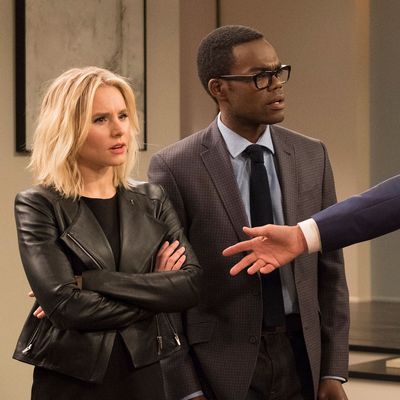
Major spoilers ahead you haven’t finished the first season of The Good Place.
Early in the second-season premiere of NBC’s The Good Place, Michael (Ted Danson) explains his deliberately diabolical approach to retooling the afterlife. “We’re keeping everything from version one that made them miserable,” he says, “and adding a bunch of new stuff they’ll hate.”
The “miserable” people he’s referring to are Eleanor (Kristen Bell), Chidi (William Jackson Harper), Tejani (Jameela Jamil), and Jason (Manny Jacinto), the four unfortunate souls who arrived in the so-called good place during season one, only to realize in the finale that the good place is actually the bad place. Michael’s words may be describing his revised approach to torturing that quartet, who currently reside in the Great Beyond subdivision Michael oversees, but they also can be interpreted as sly meta-commentary on the potential for season two of a TV show to be a letdown.
Fortunately, the second season of The Good Place, which begins Wednesday with a pair of back-to-back episodes, is no dud. After delivering one of last fall’s most assured, instantly delightful debuts, in take two, the series solidifies its status as the most intellectually engaging comedy on television. In case that makes The Good Place sound too intimidating, don’t worry: It also features lots of jokes about public drunkenness, Hawaiian pizza, and the Jacksonville Jaguars. Oh, and its other signature elements — shops and restaurants with punny names, the use of non-obscenities as surrogate curse words — are still ever-present as well. I guess what I’m saying is: holy shirt, the whole thing is forking great.
When we last saw our four flawed, dearly departed humans, they had just learned that they landed in Hades instead of heaven. Following that discovery, Michael, a demon disguised as a man, wiped their memories and hit the reset button on their good place memories so they could experience the place fresh again, which enables Michael to continue perfecting his attempt to make their post-deaths a nonliving hell. The first two episodes take a Rashomon-style approach to this scenario, showing certain scenes multiple times from different characters’ points of view as they struggle to make sense of a paradise where things seem a little … off. It’s entertaining to watch everyone get to know the other characters and the setting again when we have the benefit of a backstory they do not. It’s also, again, a little meta: Just as Michael is rebooting the good place for Eleanor & Co., the audience gets to experience it again (and again) as something different that also seems a little familiar. Like everything in this series, even the way the writers structure the narrative can be appreciated on more than one level.
Another thing that can and should be appreciated in this series is the cast. As Eleanor, Bell, the self-described “dirtbag from Arizona,” is constantly five chess moves ahead of everyone else in the game. (Jason? He’s still trying to figure out how to open up the chess board.) In nearly every scene, you can practically see Bell’s synapses firing as she tests out her theories and weighs how much she should trust Michael. Danson gets even richer material this season thanks to his character’s now open (at least to us) status as a deceitful being with a self-serving agenda. His ability to frost a line with sarcasm or chuckle with knowing resentment is spot-on perfect. The other members of the ensemble — Harper, Jamil, Jacinto, and Tiya Sircar as Vicki, who once pretended to be “the real Eleanor” as part of Michael’s ruse — are just as strong and, at this stage in the series, fully embedded in these characters. Together, they all click into place, exactly the way that soul mates, a running concern on The Good Place, are supposed to do. Collectively, they also stand out as one of the most organically inclusive casts on television.
But what continues to be most satisfying about The Good Place is what a provocative puzzle it is. Mike Schur and his writers pack tons of action, subtext, and a current of gleefully manic energy into each half hour, and they do it while continually taking each episode in surprising directions. The Good Place may be a comedy, but its sense of mystery and ability to build a world, partially dismantle it, then construct it again, outshines what’s being done on most TV dramas.
“I know that this kind of large-scale deception was not what you were trained to do,” Michael tells his staff of infernal con artists in Wednesday’s episode. Again, he’s talking about the scam they’re all trying to pull on Eleanor, Chidi, Tejani, and Jason. But one can imagine another Michael – Mike Schur – saying the same thing to his writers room of trained comedy writers.
But season two, like season one before it, confirms one thing for absolute certain: Those motherforkers know exactly what they’re doing.


